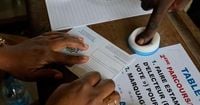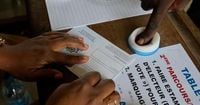Gabon’s political landscape has undergone a dramatic transformation following the country’s first legislative elections since a 2023 military coup toppled a half-century-old dynasty. On September 30, 2025, provisional results released by Gabon’s Interior Ministry revealed that the Democratic Union of Builders (UDB), a party founded just months earlier in July by the nation’s leader, Gen. Brice Clotaire Oligui Nguema, secured 55 of the 145 seats in the National Assembly. This outcome marks a pivotal moment in Gabon’s history, signaling both a break from the past and an uncertain—yet hopeful—step toward constitutional democracy, as reported by the Associated Press and Devdiscourse.
The 2023 coup was a watershed event for Gabon. For five decades, the country had been ruled by the Bongo family, with Ali Bongo Ondimba at the helm until the military, led by Gen. Oligui Nguema, seized power. The coup was justified by accusations of irresponsible governance and a desire to end what many saw as a stagnating political order. The aftermath saw the creation of the UDB, a political movement that quickly rose to prominence under Oligui Nguema’s leadership.
The legislative elections held in September 2025 were the first major test of Gabon’s new political order. According to both Associated Press and Devdiscourse, the UDB’s victory was decisive, but not absolute. The Gabonese Democratic Party (PDG), the once-dominant party of former president Ali Bongo Ondimba, managed to secure just three seats. In a handful of constituencies, the UDB and PDG joined forces, winning four seats on a joint ticket—a rare show of cooperation in a deeply divided political environment.
The significance of these elections extends beyond mere numbers. For many Gabonese citizens, they represent the first real opportunity in years to participate in a political process unshackled from dynastic rule. Yet, the road ahead remains complex. Of the 145 seats in the National Assembly, only 68 were decided in the first round. The remaining 77 constituencies, where no candidate managed to secure an absolute majority, will head to a second round of voting scheduled for October 11, 2025. In most of these districts, the contest will pit the UDB directly against the PDG, setting the stage for intense political maneuvering in the weeks to come.
Underlying these elections is a new constitutional framework adopted by referendum in 2024. The document enshrines a presidential system in which legislative power is notably limited. According to the Associated Press, Gabon’s parliament cannot topple the government, a significant departure from parliamentary systems where legislative bodies can force the executive’s resignation. This constitutional setup, while providing stability, also raises questions about the true extent of democratic oversight and the potential for checks and balances within Gabon’s evolving political system.
Another point of contention has been the country’s new electoral code, adopted earlier in 2025. The code permits military personnel, including Gen. Oligui Nguema himself, to run for elected office. This provision allowed Oligui Nguema to participate in—and ultimately win—the presidential election in April 2025, a move that some critics argue blurs the lines between military and civilian rule. Supporters, however, see it as a pragmatic step toward inclusivity during a period of national transition.
The results of the legislative elections have sparked a range of reactions across Gabonese society. For supporters of the UDB, the outcome is a validation of Oligui Nguema’s leadership and a mandate for continued reform. Many see the party’s rapid rise as evidence of widespread desire for change and a break from the entrenched interests that dominated Gabonese politics for so long. According to Devdiscourse, the UDB’s victory “highlights a change in political dynamics within the nation.”
On the other hand, the PDG’s poor showing has been met with both disappointment and introspection among its ranks. Once the unchallenged force in Gabonese politics, the PDG now faces an existential crisis. Its alliance with the UDB in several constituencies has been seen by some as a pragmatic attempt to retain relevance, while others view it as an admission of weakness. The upcoming second round will be critical for the PDG’s future, as it seeks to rebuild its base and reassert its role in the new political order.
For ordinary Gabonese, the elections have brought a mix of hope and skepticism. While many are optimistic about the prospects for genuine democracy, others worry that the concentration of power in the presidency and the military’s prominent role in politics could undermine efforts to build robust democratic institutions. The new constitution’s limitations on parliamentary power are a particular concern for those who value legislative oversight and accountability.
International observers have also been watching Gabon’s transition closely. The peaceful conduct of the first round has been welcomed as a positive sign, but there remains apprehension about the potential for unrest in the second round, especially in constituencies where the contests are expected to be tight. The ability of Gabon’s political actors to manage these tensions will be a key test of the country’s commitment to democratic norms.
Looking ahead, much will depend on the outcome of the second round of elections and the willingness of both the UDB and PDG to engage in constructive dialogue. The stakes are high. With legislative power limited and the presidency firmly in the hands of Gen. Oligui Nguema, the National Assembly’s role may be more symbolic than substantive. Nevertheless, the composition of the parliament will shape the tone of national debate and set the parameters for future reforms.
As Gabon navigates this new era, the world is watching to see whether the promise of constitutional democracy will be realized or whether old patterns of power and exclusion will reassert themselves. For now, the country stands at a crossroads—its future uncertain, but its people newly empowered to shape what comes next.



